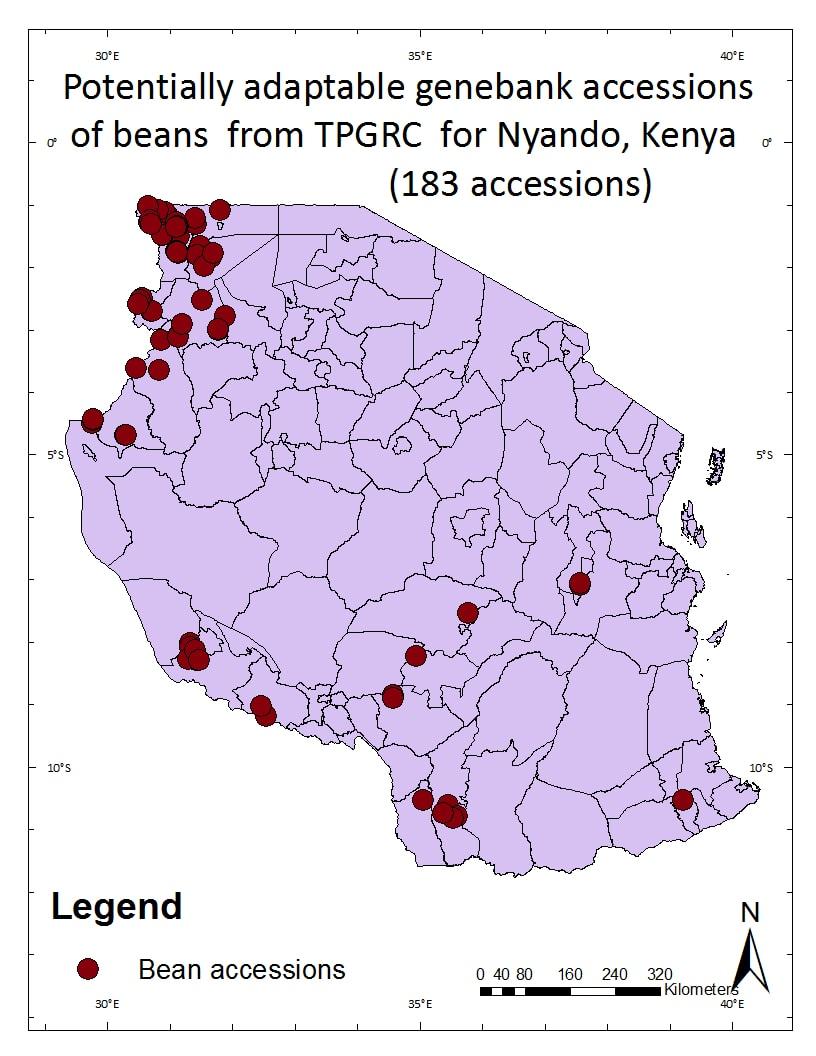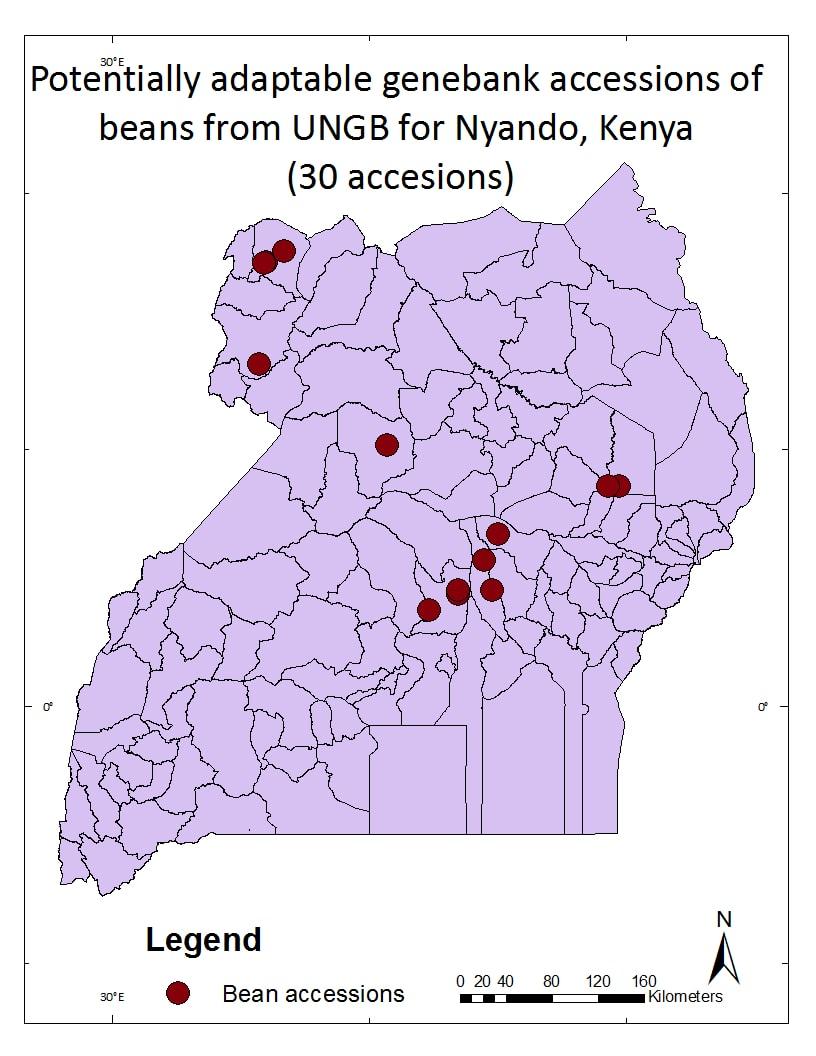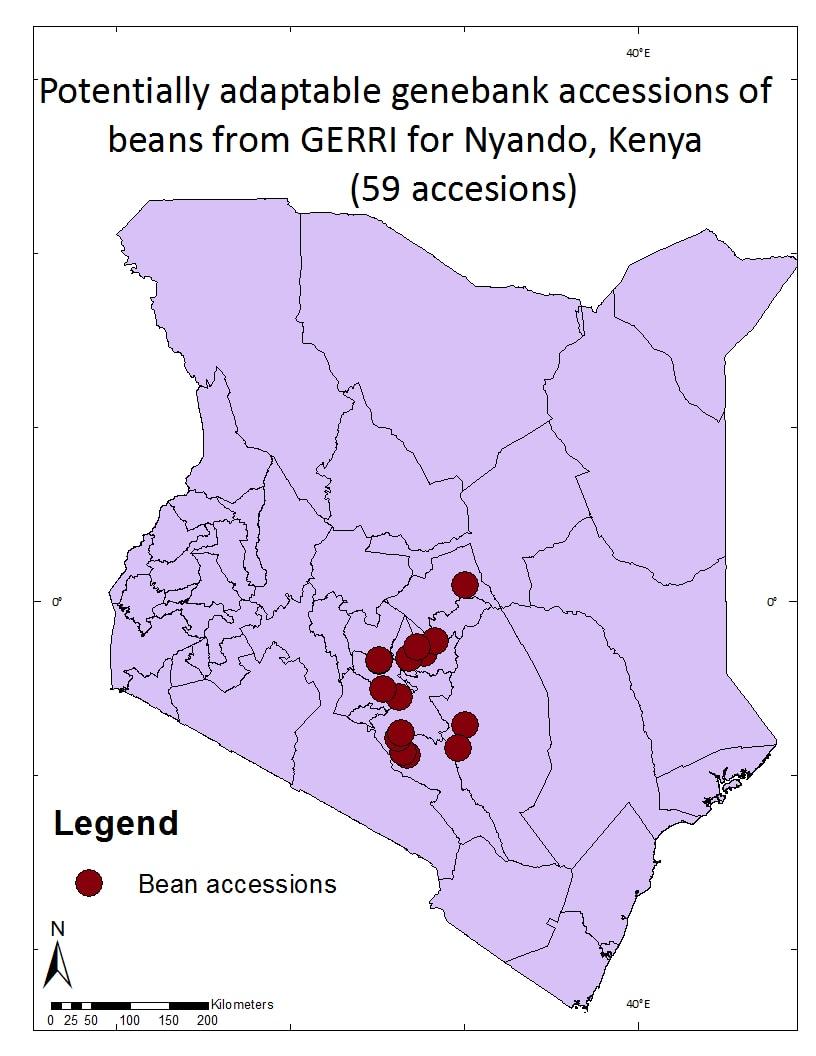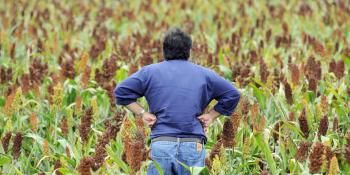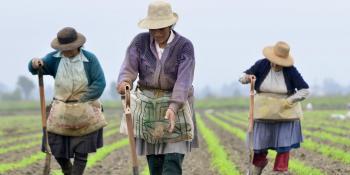Open source seed systems for climate change adaptation in Kenya, Uganda and Tanzania: highlighting the importance of policy support
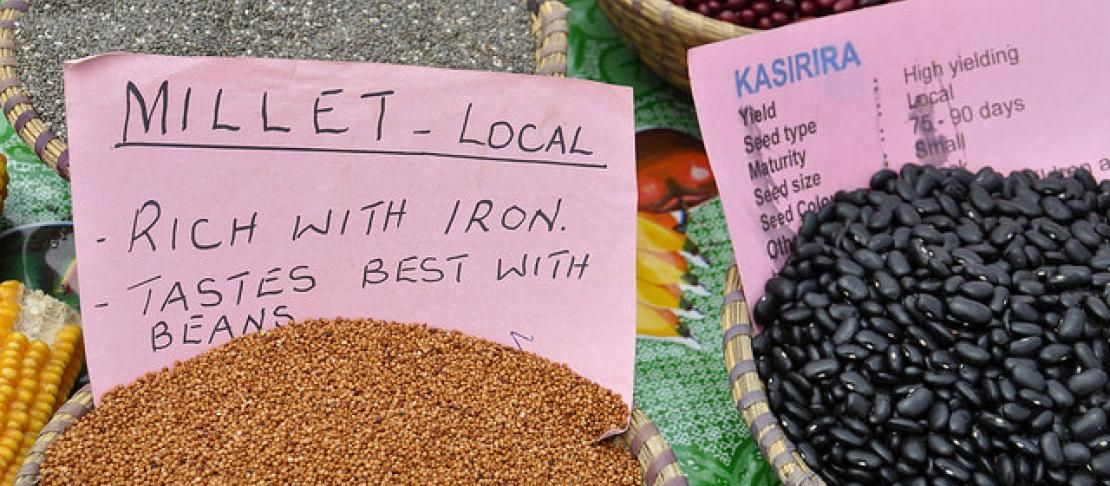
To mark the International Day on Biological Diversity, we highlight how a CCAFS-supported project empowers farmers to participate actively in protecting crop genetic diversity.
Climate change poses a serious and ever-growing threat to the food and nutrition security of resource-poor farmers globally.
In Kenya, Tanzania, and Uganda, in particular, levels of undernourishment remain high, and climate change is likely to increase this further. Agricultural production rates are low and are estimated to drop on average by 22% by 2050, sending farmers who are already struggling to feed their families throughout the year deeper into poverty traps and malnutrition. Erratic rainfall and droughts are expected to become more frequent as a result of climate change affecting production.
The homogenization of agriculture to single crops or varieties in the hope of higher yields, coupled with the associated loss of biodiversity, have decreased the resilience of resource-poor farmers and contributed to soil degradation, which is one of the major challenges in the East Africa region. In addition to this, seed and genetic resource policies and legislation may restrict the access to and freedom of exchange of seeds among farmers.
One adaptation strategy is to help farmers and plant breeders to find and use genetically controlled plant traits that are suited to their changing climate conditions. Indeed, the Fifth Assessment Report of the Intergovernmental Panel on Climate Change (IPCC) recognizes the importance of strategies based on the use, conservation and management of genetic resources for climate change adaptation. The report highlights the importance of improving crop tolerance to new conditions and improving access to gene banks to develop varieties with appropriate adaptive characteristics. It also notes the importance of using indigenous knowledge to identify adaptive strategies contributing to food security.
In response, a CCAFS-supported project, called “Open Source Seed Systems for beans, sorghum, finger millet and forage legumes for climate change adaptation," is working with smallholder farmers in four communities in Hoima, Uganda; Nyando, Kenya; and Hombolo and Singida in Tanzania. The project aims to increase community resilience and improve communities' adaptive capacity.
“Open source” seed systems (OSSS) is a concept that allows for the freedom of access and use of plant genetic material, prohibits exclusive rights and applies to any subsequent derivatives of those materials. A distinctive feature is a commitment—legal or ethical—to maintain the freedom to use, sell, and re-use selections and breeding of derivatives in accordance with Article 12 of the International Treaty for Plant Genetic Resources for Food and Agriculture (ITPGRFA).
This project’s main goal is to increase farmers’ access to a much wider range of agricultural biodiversity which will arm them with options to better manage climate risks and biotic stresses such as pests and diseases, while also creating an important source of resilient genetic resources that will be vital for future generations to continue adapting. An initial baseline survey of 1001 farmers done in the project areas revealed that farmers are facing many uncertainties due to climate change. All the sites reported shifting and shortening of the planting seasons coupled with erratic rainfall and prolonged droughts. This has led to farmers switching to varieties with shorter growing cycles or switching to more resilient crops such as sorghum, millet, and cassava.
Gene banks provide diversity for climate change adaptation
Using a range of computational programs, we identified over 400 collections of sorghum, millet, and beans from national gene banks that are suitable for current temperature and precipitation in the four sites. These were acquired through the Multilateral System (MLS) of access and benefit sharing, and so far these have been shared between the countries through Standard Material Transfer Agreements (SMTAs). This is in harmony with Articles 10 and 12 of the ITPGRFA, which outlines the importance of facilitated access for the proper functioning of the MLS.
|
|
|
Example of collections of beans identified as potentially suitable for Nyando, Kenya, from three different national gene banks. These were distributed through Standard Material Transfer Agreements between the three gene banks.
Another source of diversity for farmers to access new genetic material is through local seed networks or local seed systems. These have also been introduced through seed fairs carried out in three of the four sites, which saw over 1000 farmers from within and outside the project site exchange seed and information regarding local varieties. Two community seed banks have been established in Hoima, Uganda where 23 local bean varieties and two millet varieties are being conserved. In Nyando, Kenya there are 13 local sorghum, 6 millet, 4 bean and 6 local vegetable varieties being conserved and made available for farmers and breeders to use in accordance with Article 9 of the treaty.
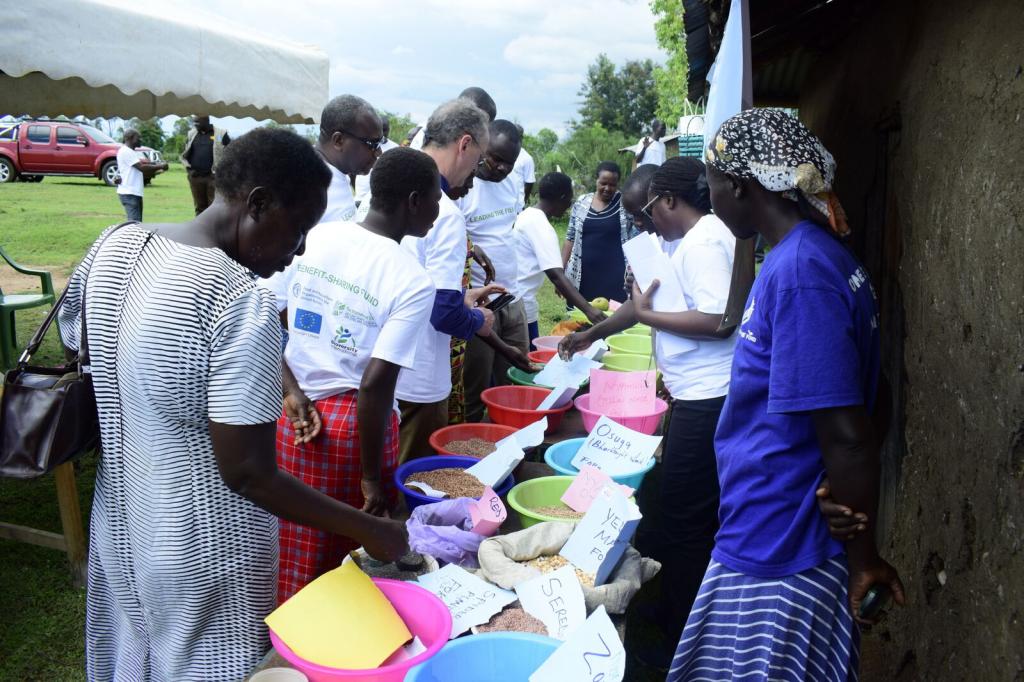
Seed fair in Nyando, Kenya in April 2018. Photo: Leahu Rodica (FAO)
Participatory varietal testing and evaluation through farmers’ networks
The materials acquired from the national gene banks are currently being tested and evaluated against climate-related biotic and abiotic stresses using participatory methods such as crowdsourcing, and the results of these tests are made available in the public domain. So far, crowdsourcing trials are underway in Tanzania and Uganda involving about 600 farmers testing 80 collections of beans, 165 of millet and 180 of sorghum. These trials are showing positive results in terms of what farmers are selecting for pests and disease resistance, drought tolerance, waterlogging, and early maturity. These candidate varieties will undergo a second round of participatory varietal “tasting” to select for cooking, taste and texture characteristics and to prioritize for breeding with candidate varieties selected for climate-related stresses.
Finally, the identified or developed varieties will be produced through alternative quality assurance mechanisms such as Quality Declared Seed (QDS) selection by farmers through seed cooperatives, social seed entrepreneurs, and community seed banks, and marketed with a “community pledge” that states that the seed and its derivatives are open access and should remain so. The details of community pledges are being discussed with farmers and other national stakeholders.
Policy support for the implementation of open source seed systems
Sharing and learning platforms have been established in three countries to document and upscale best practices such as crowdsourcing methodologies for evaluation of varietal diversity, community seed banking, and social seed entrepreneurship. Sharing and learning platforms have also been used to advocate for policy changes. Policy workshops held in each country have brought together over 200 key policymakers, policy advocacy partners and representatives of farmer organizations to discuss key policy issues on access and benefit sharing, implementation of the treaty’s Articles 10 and 12, and intellectual property rights which affect the functioning of open source seed systems.
Finding ways to allow for these open source seed systems to benefit farmers as they face the effects of climate change is a critical undertaking. Further adaptation to the changing climate will rely on agricultural biodiversity, and farmers are the front line in protecting and preserving this.
Read more about the project:
- Video: Gloria Otieno on Open Source Seed Systems
- Project page: Open Source Seeds Systems in East Africa | Hivos
- News article: Strengthening farmers’ seed system through ‘open source’ | The Citizen
The project is supported by the Benefit Sharing Fund of the International Treaty for Plant Genetic Resources for Food and Agriculture (ITPGRFA) with funding from the European Union (EU) and co-funding from the Opens Society Foundation (OSF) and the CGIAR Research Program on Climate Change Agriculture and Food Security (CCAFS). The project is implemented by Bioversity International, in partnership with the National Plant Genetic Resources Centre (NPGRC – Tanzania), The National Agricultural Research Organization’s Plant Genetic Resources Center (NARO-PGRC), Uganda, The Genetic Resources Research Institute (GeRRI), Kenya, Bioversity International, Hivos, and Sustainable Agriculture and Natural Resource Management Africa (SANREM-AFRICA).
Gloria Otieno is an Associate Scientist at Bioversity International working on the coordination and implementation of wider research and policy projects to ensure that adaptive capacity of communities is enhanced by providing improved access to genetic resources and their continued management, conservation and availability to enhance food security and improve livelihoods.

